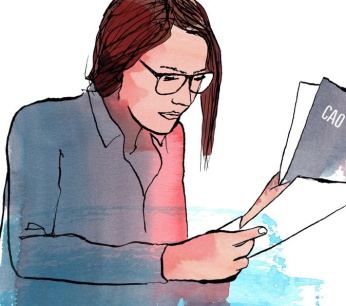Abuses of power in a small world
Unacceptable behaviour in the workplace? Norms are changing, but not yet quickly enough according to university professor Naomi Ellemers. She chairs the Royal Netherlands Academy of Arts and Sciences (Dutch: KNAW) committee that will be advising on undesirable behaviour in academia.

Beeld: Pixabay
Bullying, abuses of power, sexual intimidation: during their careers, many academics will be confronted by undesirable behaviour. In 2019, the VAWO – precursor to the General Education Union (Dutch: AOb) – collaborated with Dutch Trade Union Confederation FNV on research (in Dutch) into unsafe social situations. In the same year, the Dutch Network of Women Professors also sounded the alarm. Dutch Minister of Education, Culture and Science Van Engelshoven subsequently concluded that there is still huge scope for improvement and asked academic advisory body KNAW for recommendations on the prevention of misconduct.
Lack of safety remains a hot topic within the academic world. In mid-November the independent platform of Amsterdam’s Vrije Universiteit, Ad Valvas, wrote a report on intimidation and deception within that university’s psychology department. This even led to some staff members experiencing a burn-out or having to go into therapy. In September, measures were taken against a professor at the University of Nijmegen for ‘inappropriate behaviour’.
How can it be that it keeps going wrong?
“This demonstrates that this is something we still do not know how to deal with”, says Utrecht-based university professor Naomi Ellemers, chair of the new KNAW advisory committee. “Everyone wants things to improve, and there are all kinds of guidelines on this in place. So how can it be that it keeps going wrong?”

Naomi Ellemers. Beeld: Jack Tillmanns
Ellemers is a social and organisational psychologist and one of the founders of the activist group Athena’s Angels. A great deal of research is undertaken in her area of specialisation into misconduct in the workplace. “This has revealed that this behaviour has far-reaching consequences, not only for victims but also for their colleagues within the department”, she says. “When they see this happening time and again and no action being taken, they lose confidence in the organisation.”
But we are now finding out more and more about the conditions that facilitate and maintain such undesirable behaviour, Ellemers continues. “So we are now much more aware of what to look out for in terms of combatting this behaviour. It would be great if we can use this knowledge to develop concrete measures.”
Fresh start
Academia is a very particular working environment, in her opinion. “It’s an international network, but at the same time also a very small world. Especially in certain subject areas. It is entirely possible that you keep on coming across the same people, all the way through your career.”
And this includes people holding important posts – people who assess publications, fill vacancies and write letters of recommendation. This can lead to unequal power relationships, Ellemers argues. “If one of these people doesn’t like your work, or if you get into a conflict with someone, this can have a lasting influence on your career. You can’t just turn around and say: ‘I’ll leave and make a fresh start somewhere else, then I won’t have to deal with this person anymore.’ This throws up a big barrier to protesting about the way you’ve been treated.”
‘Babe’
The Athena’s Angels website presents (anonymised) stories that make it clear that undesirable behaviour takes many forms. “Almost all female academics experience this kind of thing”, Ellemers says.
One pregnant Ph.D. student was asked by her supervisor whether she might consider having an abortion
For example: female academics who are assumed to be secretaries, or academics who are referred to by male colleagues as ‘babe’ or ‘lass’. Other examples go much further: one pregnant Ph.D. student was asked by her supervisor whether she might consider having an abortion.
As Ellemers explains, the experiences reported by women often concern sexuality or pregnancy and childbirth. “Fortunately, these days we have more reasons to say in relation to these kinds of topics: ‘this is just not okay, I can talk to people about this’.”
According to Ellemers, the topic of socially unsafe situations leads to interesting discussions with people of her generation. “Norms concerning what is acceptable behaviour in the workplace are changing rapidly.” Which makes the whole issue all the more complex. “People who have been around for a while know that something that is no longer tolerated wasn’t formerly seen as a big problem. Maybe not so nice, they might have said back then, but that’s just the way it is. I’ve experienced this myself often enough: ‘jokes’ that are not at all funny, inappropriate suggestions – I’m sure you can imagine. How awful that stuff like this is still happening, I sometimes think.”
Formal complaint
One problem we frequently hear about is that victims of behaviour that goes too far sometimes don’t dare make a formal complaint. So then the institution’s response is often, well there’s no action we can take then. “The result is that there may be guidelines and codes of conduct in place, but these are just not being enforced”, Ellemers says.
Nevertheless, it is good that the rules are there, she believes. “After all, people who are accused of something have to be able to defend themselves. On the other hand, you don’t want victims who are justly reporting an incident to be ignored. This is a hard balance to find, but our committee has yet to start work so I don’t have any concrete solutions right now.”
Ideally, you want people to start talking to one another at a much earlier stage
One thing she can say is that she doesn’t expect better rules and regulations alone to be sufficient. Which means that the KNAW committee will have to take a long hard look at the culture within institutions, research groups and departments. “Ideally, you want people to start talking to one another at a much earlier stage”, Ellemers says. “This could be managers and professors among themselves, but it must also be possible for employees to say to their superiors: do you realise that what you say can have a massive impact? This is something that, at present, people still find really difficult.”
Optimistic
The committee will issue its recommendations at the end of 2021, and Ellemers is optimistic. “All the parties I am currently in contact with are not only highly motivated, but also frustrated because what is being done now is not enough. I think that’s a good starting point: we’re not yet where we should be, but we all really want things to improve.”


